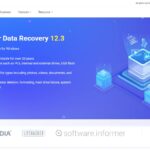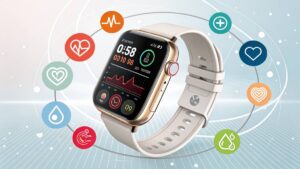AI Revolutionizing Healthcare
In the dynamic landscape of modern medicine, Artificial Intelligence (AI) is emerging as a game-changer, revolutionizing how healthcare is delivered and experienced.
Imagine a world where diagnoses are swift and precise, treatments are tailor-made to each individual, and administrative tasks vanish into the background, allowing healthcare professionals to focus solely on patient care.
This isn’t a distant future—AI is already transforming clinics and hospitals, enhancing efficiency, accuracy, and patient outcomes. Dive into how these trailblazing technologies are seamlessly integrating into healthcare practices, setting the stage for a healthier, smarter tomorrow.
AI in Healthcare
Artificial Intelligence (AI) is shaking things up across the board, and healthcare’s catching the fever, too! Thanks to leaps and bounds in machine learning and number-crunching tech, AI is sprucing up healthcare services and tackling issues that used to stump us.
Tools like neural nets and natural language processing are finding their way into clinics, giving a boost to diagnostic whizzes, tailoring treatment masterstrokes, and smoothing over the nuts and bolts of daily operations.
| AI Technology | Application in Healthcare |
|---|---|
| Neural Networks | Spotting diseases, scrolling through medical images |
| Natural Language Processing | Snagging details from patient files, listening in for medical notes |
| Machine Learning | Crystal-ball analytics, patience risk lookout |
| Robotics | Surgery sidekick, automating patient care |
Benefits of Integrating AI in Healthcare Practices
Rolling AI into the healthcare scene packs a punch—it’s all about turbocharging efficiency and bumping up patient wins!
- Sharper Diagnoses: AI apps cook through heaps of data from medical charts to imaging, unearthing patterns that might sneak past your average doc. The result? Pinpoint diagnoses and swift lifesaving moves.
- Tailored Treatment: Bringing together info from genetics to patient backstories, AI cooks up treatment plans that fit like a glove, getting results with fewer hiccups. Curious? Dive into our piece on personalized treatment plans.
- Operational Smoothness: AI is the new office ninja—handling dull stuff like scheduling, invoicing, and patient sorting so the docs can focus on patients, not paperwork.
- Saving Some Bucks: Be it pinpoint diagnoses or trimmed treatment trials, AI cuts out the guesswork from treatments, saving hard-earned cash for both medical centers and Joe and Jane Doe patients.
- Catching Early Signs: By reading between the lines of patient stats, AI can wave red flags about illnesses before they even knock! Early birds in disease tackling lead to better survival odds. For the scoop on tech wizardry behind it, swing by our piece on machine learning basics.
With AI in the driver’s seat, healthcare’s not just shooting for the stars; it’s taking efficiency to a whole new plane. These developments are lighting the way for a new age in how healthcare is served and handled.
Want to geek out more on AI and its mind-boggling tricks? Check out our reads on ai applications in education and ai ethics.
Impact on Patient Care

AI is really shaking things up in patient care, bringing new ways to come up with treatments and catch diseases early.
Personalized Treatment Plans
AI-powered treatment plans are like a tailor stitching a suit just for you. Instead of a cookie-cutter approach, doctors now have access to data that helps them craft a treatment unique to your genes, lifestyle, and health history. It’s a healthcare wardrobe tailored to fit!
| Old School Way | AI-Driven Magic |
|---|---|
| Followed general rules | Uses specific patient info |
| One-size-fits-all healthcare | Custom solutions from DNA to daily habits |
| Takes its sweet time | Quick adjustments thanks to AI smarts |
With AI in the driver’s seat, patient treatments improve as they are honed to match individual needs, narrowing the chance for negative reactions. Tools like predictive analytics and clever machine learning are the wizards behind this change.
Early Disease Detection
Spotting issues early can be the difference maker in healthcare. AI comes in clutch by scanning through mountains of medical info like a pro detective, helping even the best doctors catch potential problems before they become real head-scratchers.
Research shows AI can sometimes outsmart humans at early disease detection, especially with things like cancer and heart disease. These smart systems dive into medical images, genetic clues, and patient files to find problems that might signal a brewing storm.
| Disease | Regular Detection Wins | AI’s Wins |
|---|---|---|
| Breast Cancer | 86% | 95% |
| Lung Cancer | 80% | 90% |
| Heart Conditions | 70% | 85% |
These numbers show AI’s promise in boosting diagnosis quality and speed, which means better preventative health care and smarter early detection. This path eases healthcare system pressures and lifts the everyday life of patients.
Bringing AI into healthcare shakes up patient treatment while tackling staff shortages and squeezing the most out of resources. Want to see what AI’s up to elsewhere? Dig into these AI-finance tricks or check out AI-action in education.
Streamlining Healthcare Operations
Artificial Intelligence (AI) is shaking things up in healthcare by boosting efficiency and lightening the load when it comes to paperwork. Adding AI into the mix means medical folks spend less time on the boring stuff and more on what really matters—taking care of people.
Administrative Tasks Automation
AI tech is busy taking over repetitive chores, so healthcare workers aren’t chained to their desks with paperwork. This not only keeps things moving but also means more attention can be given to patients who need it.
- Scheduling Appointments: Let AI handle the calendar—fewer mistakes, less hassle, and more time for real problems.
- Billing and Coding: AI is a whiz at getting the billing right, keeping those insurance folks happy, and getting everything sorted faster.
- Patient Records Management: Keep patient info current and ready without breaking a sweat.
| Task | Old Time (mins) | New Time with AI (mins) |
|---|---|---|
| Appointment Scheduling | 15 | 5 |
| Billing and Coding | 30 | 10 |
| Patient Records Update | 25 | 7 |
Read up on ai tools for business to see how these things make life easier.
Workflow Optimization
AI is all about making flow better, smoothing out hitches, and keeping the whole show running smoothly in hospitals and clinics.
- Resource Allocation: Get the right people in the right place with AI’s help—less wasted time and better gear use.
- Predictive Maintenance: AI checks the pulse of equipment—ahead of time—so nothing conks out unexpectedly.
- Patient Flow Management: See how people move, tweak the setup, and chop waiting times using AI’s sharp insights.
| Workflow Part | Standard Method | AI-Enhanced Way |
|---|---|---|
| Resource Allocation | Wing it with the Schedule | Smart Allocation with Data |
| Equipment Maintenance | Routine Checkups | Predictive Picks |
| Patient Flow Management | Manual Tweak and Guesswork | Real-Time Savvy Analytics |
These AI tricks don’t just make the admin side of things smooth; they take patient care up a notch. For more on this, swing by our article on ai in healthcare.
AI is the unsung hero of healthcare operations, getting the boring bits automated and the tricky stuff working like clockwork—so healthcare can keep up with what today’s medical scenes need. Find out why machine learning isn’t just a buzzword, but a must-have in machine learning algorithms overview.
Challenges and Concerns
Data Privacy and Security
Bringing artificial intelligence (AI) into healthcare isn’t just a walk in the park. It stirs up massive concerns about privacy and security, as patient data is more sensitive than your grandma’s secret recipe. Imagine handing over mountains of personal patient data – it’s like waving a red flag in front of lurking cyber criminals! It’s super important to slap on iron-tight protection around this info to keep trust alive and stay on the right side of the law.
AI gobbles up heaps of data to work its magic; we’re talking medical histories, current treatments, and sometimes intimate genetic details. Holding this goldmine securely and keeping access under the tightest lock and key is a no-brainer. Tools like encryption, access control, and detection systems are mandatory to guard this treasure trove.
| Aspect | Concern |
|---|---|
| Data Storage | Stashing sensitive health info in a super safe vault |
| Data Access | Keeping the gate closed to all but the right folks |
| Data Transmission | Encrypting data so nobody intercepts it mid-flight |
| Data Integrity | Making sure data remains spot-on and untampered through time |
Solid cybersecurity measures are a must to dodge breaches and stay grounded in regulations like HIPAA. To read more about where big data and AI collide, check out our article on big data and ai.
Ethical Considerations
Getting AI into healthcare brings more than just technological hurdles; it’s a whole ethical minefield. How well AI performs hinges on the data it’s been fed. Toss some biased data into the mix, and you’ll have AI spitting out partial results, causing havoc in healthcare fairness. It’s vital to pin down these biases pronto for AI to play fair.
Then, there’s the whole consent drama. Folks need to know exactly how their data’s getting used. Being upfront about data use and how AI arrives at its decisions is crucial for ethical standards.
| Ethical Concern | Description |
|---|---|
| Bias in Data | Feeding AI with fair and diverse data |
| Informed Consent | Ensuring patients know what’s happening with their info |
| Transparency | Being open about how AI makes its decisions |
| Accountability | Pinning down responsibility for AI-generated medical calls |
Another tricky topic is accountability. AI starts making choices usually left to human hands, so who takes the fall when things go south? Defining who answers to AI-induced errors is vital for ethical AI in healthcare.
Ethical AI rollout also means grappling with job loss fears. Sure, AI boosts productivity, but it might also put some jobs on the line. It’s important to have backup plans with training programs and policies to help healthcare workers transition into this new tech-heavy gig. For more nitty-gritty on AI ethics, see our full article on ai ethics.
Tackling these hurdles and worries can pave the way for AI to join hands with healthcare, bringing loads of perks while tackling the risks head-on.
Implementing AI in Healthcare
Rolling out AI in healthcare isn’t just tossing some fancy tech into the mix and calling it a day. It’s about weaving AI into the healthcare fabric while giving our docs and nurses a helpful, not overwhelming, hand.
Training Healthcare Professionals
To make sure AI truly helps in healthcare, the people donning the white coats need a bit of a nerdy makeover, too. This means getting them up to speed on AI basics, showing them how AI can be a tool, not a replacement, and making them scratch their heads over ethical conundrums. Training happens at three levels, each aimed at folks with differing expertise.
| Training Level | Focus Areas | Who’s in the Classroom? |
|---|---|---|
| Basic | AI 101, Ethical Dilemmas | Medical Students, Nursing Pros |
| Intermediate | Tools & Tricks, Paperwork & Data | Docs, Hospital Managers |
| Advanced | Fusing Systems, Building AI Magic | Researchers, Tech Gurus |
AI courses should be as regular as coffee breaks in medical schools, and even the seasoned pros need to keep up with AI’s latest party tricks. For those diving deeper into AI waters, we’ve got some resources on machine learning basics and neural networks explained.
Integration with Existing Systems
AI joining healthcare is like trying to fit a new fish into an old pond. There’s a bunch of stuff needing obvious attention, like making sure AI dances nicely with current tech, digital health records, and how things usually work in hospitals. Breaking it down might look like this:
- Check The Goods: Take a good hard look at what’s already there to see how AI could lend a helping hand.
- Get The Data Lined Up: Make sure info from all corners lines up straight for accurate AI use.
- Trial and Smiles: Test AI in a controlled setting, then tweak based on what works or doesn’t.
- Go Big or Go Home: Roll out AI where it’s beneficial, but keep an eye out to ensure things run smoothly.
| Integration Step | What You Need To Do |
|---|---|
| Check The Goods | Review Existing Systems, Analyze Needs |
| Get The Data Lined Up | Clean Data, Map Data Flow |
| Trial and Smiles | Controlled Testing, Evaluate Performance |
| Go Big or Go Home | Full Implementation, Ongoing Check-ups |
This whole shebang has to play nice with rules about patient privacy and data safety. For more on those maddening ethical issues, take a peek at our article on AI ethics.
Bringing AI into healthcare isn’t just about boosting patient care but also about polishing the operational cogs. Focus on clear training paths and smooth sailing into already trusted systems so the medical field can wring every bit of good from AI’s potential.
Future Trends in AI Healthcare
Artificial Intelligence is shaking things up in healthcare, bringing fresh ideas to patient care and making operations smoother than ever. We’re diving into the latest and greatest in predictive analytics and virtual health assistants.
Predictive Analytics
Predictive analytics is all about AI crunching big numbers to guess what might happen next in the health department. It helps doctors spot issues before they’re even on the horizon, so they can act fast and keep things under control.
AI is really getting into these areas:
- Disease Prediction: Imagine being able to tell who might get sick with issues like diabetes or heart troubles before it even happens. That’s the magic of these predictive models.
- Hospital Readmission Rates: Some folks keep coming back to the hospital. With AI, hospitals can figure out who might need extra attention to prevent that.
- Resource Allocation: With AI in the driver’s seat, hospitals can make sure staff and tools are just where they need to be for top efficiency.
Here’s how old school analytics stacks up to AI-fueled predictions:
| Aspect | Traditional Analytics | AI-Powered Predictions |
|---|---|---|
| Data Speed | Slow | Light-speed |
| Accuracy | So-so | Pinpoint |
| Data Volume | Not much | Mountains |
| Proactive Moves | Meh | Spot on |
Hungry for more? Check out the scoop on big data and AI.
Virtual Health Assistants
Virtual health assistants are like having a personal doctor in your pocket. These AI helpers are reshaping how patients connect with healthcare, making info and support easier to get than ever before.
Here’s what they can do:
- Symptom Checking: Enter your symptoms, and these smart tools will give you the low-down before you see a doc.
- Appointment Scheduling: No more phone tag. AI makes booking doctor visits a breeze.
- Medication Reminders: Forget if you took your meds? Your pocket doc won’t.
What’s the upside of these virtual pals?
| Benefit | What’s In It for You |
|---|---|
| Easier Access | Health tips any time you need them |
| Better Patient Interaction | Tailored advice just for you |
| Less Admin Hassle | Let AI handle the mundane stuff |
Discover more about AI’s chat skills with our article on natural language processing.
Healthcare big wigs who keep up with these tech goodies can really use AI to up their game in patient care and trim down on wasted time and effort. For the tech lovers, our Python guide for AI is a must-read.
Staying on top of what’s happening in AI and healthcare is the real way to smarten up how we look after folks and run things. Simple as that.
Regulatory Outlook
Understanding the maze of rules around AI in healthcare is key for anyone serious about keeping those tech whispers from becoming a medical roar. As smarty AI gizmos get cozy with stethoscopes everywhere, rules are popping up to make sure they play nice, treat us right, and don’t hog all the cookies.
AI Rules in Healthcare
These rules aren’t just picky prescriptions; they’re here to make sure AI is like a good house guest in our docs’ offices, safe and considerate. Different folks around the globe have their eyes peeled, writing up playbooks for robots to follow so they don’t go off-script when it comes to patient care.
| Region | Watchdog Group | Must-Follow Rule |
|---|---|---|
| United States | Food and Drug Administration (FDA) | 21st Century Cures Act, |
AI/ML-Based Software as a Medical Device (SaMD) |
| European Union | European Medicines Agency (EMA) | General Data Protection Regulation (GDPR), Medical Device Regulation (MDR) |
| Japan | Pharmaceuticals and Medical Devices Agency (PMDA) | Act on the Protection of Personal Information (APPI) |
These regs zone in on stuff like:
- Getting the Data Right: Your AI’s got brains, but does it have facts to back it up?
- Baffle-Free Checks: Routine check-ups to make sure AI isn’t getting lazy—or dangerous.
- Patient Safety Alarms: Setting up a safety net so patients don’t get the raw end.
Have a look-see at how these fine prints meet the ABCs of machine learning in our article on machine learning basics.
Policy Implications
Policies don’t just float in the air, you know—they gotta be ready for action, harmonizing all the AI symphony parts, from medicos to geek wizards, and everyone in between. They’re the crowd control keeping data safe, bias in check, and AI education top of the class. Things to keep on your policy radar include:
- Keep It Private, Keep It Safe: With all that patient data swirling around, lock it down, folks! The EU’s GDPR sets a mighty fine example.
- Playing Fair and Nice: Smarts with a heart—that’s what you need. Keep bias quiet, make things crystal-clear, and hold AI’s hand when it asks for help. Dive deeper into the heart of the matter on our AI ethics page.
- School’s in Session: Docs need a tech toolbox, just like your old shop class but way more high-brow. Tips and tricks live on our top machine learning courses page.
- Fair for Every Last One: AI should lift all boats, not leave any stranded. Let’s aim to make healthcare look more like a gathering and less like a lottery win.
| Policy Spot | Keep Eyes On… |
|---|---|
| Data Privacy | Locking up patient info, all snug and GDPR-friendly |
| Playing Fair | Keeping bias under wraps, all cards on the table |
| Hitting the Books | Doctors need computer-whispering down pat |
| Keeping It Fair | AI for all, not just the chosen few |
These rules and tips build a solid runway for AI dreams in healthcare, keeping everyone happy and healthy. Craving more AI goodness across industries? Check out what’s cooking in ai applications in finance.
With the right know-how on rules and policies, movers and shakers can lead AI into the healthcare spotlight—not with cool gadgets but with rock-solid morals.
Conclusion
As we navigate the promising horizons of AI in healthcare, it’s clear that these technologies are not just enhancing but fundamentally transforming the medical field. From sharper diagnoses and personalized treatments to streamlined operations and early disease detection, AI is proving to be an invaluable ally in delivering superior patient care.
While challenges like data privacy and ethical considerations remain, the ongoing integration of AI promises a future where healthcare is more efficient, accessible, and patient-centered.
Embracing these advancements with thoughtful implementation and robust safeguards will ensure that AI continues to elevate healthcare practices, paving the way for innovations that save lives and improve well-being worldwide.
Additional Resources and Authority References
- “Artificial Intelligence in Healthcare: Past, Present and Future”
PubMed Central - “The Impact of Artificial Intelligence on Healthcare”
World Health Organization - “Ethics of Artificial Intelligence in Healthcare”
Stanford Encyclopedia of Philosophy
Frequently Asked Questions (FAQs)
Q1: How is AI improving diagnostic accuracy in healthcare?
AI analyzes vast amounts of medical data and images to identify patterns that may be missed by humans, leading to more accurate and timely diagnoses.
Q2: What are the benefits of personalized treatment plans powered by AI?
AI integrates genetic, lifestyle, and medical history data to create customized treatment plans, enhancing effectiveness and reducing adverse reactions.
Q3: How does AI streamline healthcare operations?
AI automates administrative tasks like scheduling, billing, and patient records management, allowing healthcare professionals to focus more on patient care.
Q4: What are the main challenges of integrating AI into healthcare?
Key challenges include ensuring data privacy and security, addressing ethical concerns, and providing adequate training for healthcare professionals.
Q5: Can AI help in early disease detection?
Yes, AI can analyze patient data to identify early signs of diseases, enabling proactive interventions and improving patient outcomes.
Q6: What role do virtual health assistants play in patient care?
Virtual health assistants provide support through symptom checking, appointment scheduling, and medication reminders, enhancing patient engagement and accessibility.
Q7: How is AI regulated in the healthcare industry?
AI in healthcare is governed by regulations from bodies like the FDA, EMA, and PMDA, focusing on data protection, safety, and ethical use.
Q8: What future trends are expected in AI healthcare integration?
Future trends include advancements in predictive analytics, expanded use of virtual health assistants, and more sophisticated AI-driven treatment options.



















